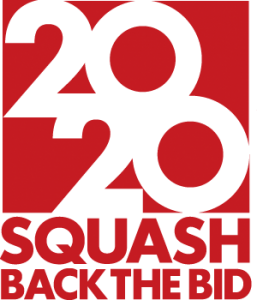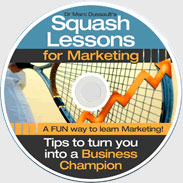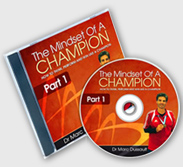I recently competed at the 2010 Pan Pacific Masters Games, in the men’s squash tournament, in the 45-49 age category, I played well with significant challenges and obstacles as I noted in a previous blog post.
While I was in beautiful Queensland, I took the day before and after the competition to relax and enjoy what the Gold Coast has to offer. One of my favorite pastimes is reading. Over the weekend, I read 3 books (I am after all a speed reader!). Two of them were on sport psychology and the third on business and strategy.
One of the strategies I use to get access to hard-to-get information, tips and strategies is to go into second hand bookstores and look for non-bestseller titles that could be a priceless source of inspiration, motivation or information.
While browsing through a second-hand bookstore in Broadbeach, I stumbled across “Venus and Serena: My seven years as the Williams sisters hitting coach” by David Rineberg.
Written in a very personal style synonymous with non-professional writers, his detailed account of their training regimen was both illuminating and revealing.
The amount of preparation that went into their ‘formation’ as future professional tennis players was as unique as it was strategic. I highly recommend it if you are an elite or otherwise competitive racket sport athlete.
There are countless lessons, tips and techniques to glean from it.
The top 3 that come to mind include:
- Train so you develop the skills and abilities of the athlete you want to become, within the time frame you’ve set for yourself. In my syntax, determine your decision-making horizon and retrospectively chunk back to where you are today.
- Be patient with you progress without becoming complacent. Everything takes time and as long a progress is being made, be content with it in so long as it is within your designated time frame.
- To out-perform your peers and rise in the rankings, you have to do something different. If you train and do what everyone else does, you’ll only track along with THEIR progress. Training MORE won’t do it. Only DIFFERENT will.
Self-analysis, diagnosis and prognosis are a must – unless you know what you’re doing, you can’t identify what to change, fix or improve let alone how to go about that improvement. In my business coaching and mentoring that I do with my entrepreneurial clients, I serve that role.
In sport, you need to have a coach or at the very least a feedback mechanism such as video footage to dissect what you’re doing, or not doing. Objectivity of course is key!
A second book, this one a bestseller is John McEnroe’s autobiography “Serious”. Growing up with McEnroe, Connors, Lendl and Borg as the tennis elite, it was enlightening to hear his view on his ‘tantrums’ and outbursts… It’s a very valuable perspective on a lonely journey to the top and back down. Every racket sport athlete should read it, along with Pete Sampras’ “Mind Of A Champion”.
The reason I blog about these books is because as an elite athlete, your progress is not solely dependent on your physical ability, skills and aptitudes. It’s also heavily dependent on your psychological and emotional maturity and development in lockstep with your physical accomplishments. The better you get, the tougher you need to become.
Easier said than done.
One of the ways to get tougher is to understand what others have been through and how they overcame their insecurities, vulnerabilities and weaknesses. It’s a personal journey that transcends sport. The games, seasons, championships and rankings are just a score-keeping mechanism to let you know how you’re going!
There are not enough really good books out there to help you become the best athlete you can be – but I can tell you one thing, I came across a really, really good one at the Pan Pacific Games that I will introduce you to in my next blog post – you’ll have to wait for my “official review” and analysis!
Psst! I met with the author personally and guess what? He’s a multiple champion athlete and based in Rocky (That means he’s an Aussie).
For more great mental toughness books I recommend, click the hyperlink.





Marc Dussault has turned his insights of the mindset of a champion into powerful strategies he lives and teaches. Here is a real world example that demonstrates the success of both combining as he says in point 3 of outperforming by continuing to look to doing something different than before and the sweet spot of an exponential mindset is frequent, achievable 1% improvements:
Kevin Thompason at Northumbria University in England has proved that in a double blind test that he can get racing cyclists to improve their best performance by 1%, by tricking them. By getting racing cyclists to race an avatar on a stationary bicycle, where they were told the Avatar they were racing was them at their best previous performance, where in reality the avatar was going 1% faster, that he could get them to match the avatar and so break their record. He tried other levels such as 5% faster but it didn’t work. 1% was the right amount as Marc explains. Click here to read the article that explains the 1 Percent Improvement Doctrine applied to cyclists.